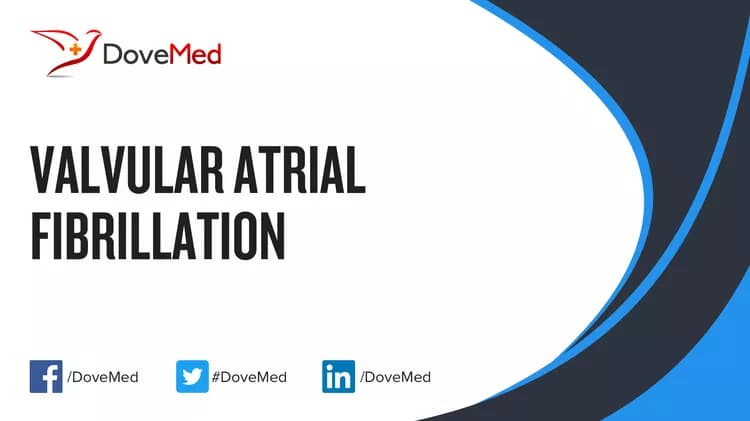What are the other Names for this Condition? (Also known as/Synonyms)
- Atrial Fibrillation with Valvular Disease
- Atrial Fibrillation with Valvular Heart Disease
- VAF (Valvular Atrial Fibrillation)
What is Valvular Atrial Fibrillation? (Definition/Background Information)
- Valvular Atrial Fibrillation (VAF) is a specific subtype of atrial fibrillation (AF) that occurs in conjunction with heart valve conditions, particularly those involving stenosis (narrowing) or regurgitation (leakage) of the heart valves
- In this condition, irregular and often rapid electrical signals disrupt the normal rhythm of the heart's upper chambers (atria), primarily due to malfunctioning heart valves. Valvular Atrial Fibrillation is mostly observed in older adults
- The signs and symptoms of Valvular Atrial Fibrillation are similar to non-valvular AF and can include palpitations, rapid or irregular heartbeat, chest discomfort, shortness of breath, dizziness, and fatigue
- The diagnosis is made through an electrocardiogram (ECG) to confirm the presence of AF. Further evaluation is essential to assess the heart valve condition and determine if Valvular Atrial Fibrillation is present
- The treatment of Valvular Atrial Fibrillation involves managing atrial fibrillation symptoms and addressing the underlying heart valve issue. Medications to regulate heart rhythm and rate may be prescribed. In some cases, surgical intervention, such as valve repair or replacement, may be necessary to improve both the heart valve condition and AF
- The prognosis for Valvular Atrial Fibrillation depends on the severity of the underlying valve condition and how effectively it can be managed. Proper treatment, including addressing the valve issue, can significantly improve the individual's quality of life and reduce the risk of complications associated with atrial fibrillation such as stroke
Who gets Valvular Atrial Fibrillation? (Age and Sex Distribution)
- Valvular Atrial Fibrillation can affect individuals of various ages but is more common among older individuals having pre-existing valvular heart diseases, such as mitral valve stenosis or regurgitation
- Both males and females can be affected by this condition, although a greater number of cases are reported in women
- This condition may be observed worldwide, and no particular race or ethnic preference is noted
What are the Risk Factors for Valvular Atrial Fibrillation? (Predisposing Factors)
The following are the risk factors for Valvular Atrial Fibrillation:
- Advancing age
- Gender: Women are more prone to mitral valve diseases
- History of heart valve conditions, rheumatic fever, and congenital heart defects
- Family history of heart disease
It is important to note that having a risk factor does not mean that one will get the condition. A risk factor increases one’s chances of getting a condition compared to an individual without the risk factors. Some risk factors are more important than others.
Also, not having a risk factor does not mean that an individual will not get the condition. It is always important to discuss the effect of risk factors with your healthcare provider.
What are the Causes of Valvular Atrial Fibrillation? (Etiology)
- Valvular Atrial Fibrillation often arises from underlying valvular abnormalities, including calcification, scarring, or deformities of the heart valves
- These structural changes can disrupt the heart's electrical pathways and trigger atrial fibrillation
What are the Signs and Symptoms of Valvular Atrial Fibrillation?
The signs and symptoms of Valvular Atrial Fibrillation may include:
- Palpitations
- Irregular heartbeat
- Fatigue
- Shortness of breath
- Dizziness
- Chest discomfort
- Edema (swelling) due to heart failure
How is Valvular Atrial Fibrillation Diagnosed?
A diagnosis of Valvular Atrial Fibrillation may involve the following tests and exams:
- Detailed medical history and physical examination
- Electrocardiogram (ECG or EKG) to measure the heart’s rhythm and electrical activity
- Echocardiogram to evaluate the structure and function of the heart
- Imaging studies to assess valve function and determine the presence of atrial fibrillation and underlying heart valve condition
Many clinical conditions may have similar signs and symptoms. Your healthcare provider may perform additional tests to rule out other clinical conditions to arrive at a definitive diagnosis.
What are the possible Complications of Valvular Atrial Fibrillation?
The complications of Valvular Atrial Fibrillation can include the following:
- Increased risk of stroke due to blood clots forming in the atria
- Heart failure
- Exacerbation of underlying valvular heart disease
How is Valvular Atrial Fibrillation Treated?
The treatment of Valvular Atrial Fibrillation aims to restore normal rhythm, control heart rate, prevent blood clots, and manage underlying valvular conditions. The treatment options may include:
- Medications
- Cardioversion
- Catheter ablation
- Surgical valve repair or replacement
- Anticoagulation therapy
How can Valvular Atrial Fibrillation be Prevented?
The prevention of Valvular Atrial Fibrillation involves managing risk factors, adhering to prescribed medications, regular medical follow-ups, and addressing valvular heart disease early to prevent its progression.
What is the Prognosis of Valvular Atrial Fibrillation? (Outcomes/Resolutions)
With appropriate treatment and management of both atrial fibrillation and valvular disease, individuals with Valvular Atrial Fibrillation can experience improved quality of life, reduced symptoms, and a lower risk of complications.
Additional and Relevant Useful Information for Valvular Atrial Fibrillation:
- Atrial fibrillation is the most common and potentially serious heart rhythm disorder, usually affecting older adults. The characteristic symptoms associated with this condition are rapid and irregular heartbeat, chest discomfort, and shortness of breath
The following resource link may help in better understanding Atrial Fibrillation:
https://www.dovemed.com/diseases-conditions/atrial-fibrillation/
Related Articles
Test Your Knowledge
Asked by users
Related Centers
Related Specialties
Related Physicians
Related Procedures
Related Resources
Join DoveHubs
and connect with fellow professionals


0 Comments
Please log in to post a comment.